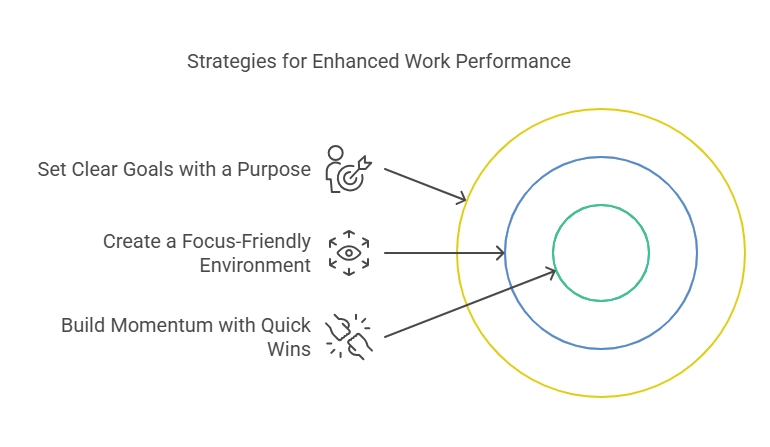I’m working a full time, corporate 9-5 job, and I had so many days where I felt unmotivated to do even the bare minimum. Yeah, of course this depends on your job, the company you work for and so many external factors. But sometimes, it’s just the way you feel, even if you’re satisfied with everything else. And not to sound repetitive, but that’s okay.
On days like this, I found that these 3 ways to improve work performance – setting clear goals, being focused and starting with simple, quick tasks can boost my productivity greatly. Leeeet’s get started!
Positive Areas of Improvement – Examples
Before diving into the tips, I want to share some examples that have worked for me. These small changes are a great starting point if you’re looking to tweak your work habits:
- Staying Proactive: Rather than waiting for instructions, I try to anticipate what needs to be done and take the lead where I can.
- Improving Communication: Whether it’s being more concise in emails or speaking up during meetings, clear communication is a must.
- Organizing Your Digital Files: A cluttered desktop or email inbox can slow you down. Keeping things tidy saves time and makes you feel more in control.
There are always some areas of improvement at work for us to work on, no one is the perfect employee. These don’t require any drastic changes and in return they can be so beneficial.
3 Practical Ways to Improve Work Performance
Here are the three most effective strategies I’ve used to boost my productivity and work efficiency.
Set Clear Goals with a Purpose
When we talk about work goals, these have to be real specific. In my previous job, I had a set of goals already made for me, by my manager, and these were really specific to my role, my experience, and my capabilities. At my current job, we don’t set such goals, but we do have KPIs that we follow and track. So from years of working in corporate, I can tell you that this is how you should approach the goals you set for work.
Here’s how I create my goals now:
- I look at my KPI sheet or the goals my manager set, and I write down 2-3 goals to work on that day.
- I make sure they’re tied to a larger purpose, like meeting a deadline or improving a skill.
- I break big goals into smaller, manageable tasks.
This approach gives me a clear roadmap for the day and keeps me motivated. If you’re looking for things to improve on at work, start with your goal-setting process. This is a simple way to gain clarity and direction.
Create a Focus-Friendly Environment
Distractions can kill your productivity, and I used to be the queen of distractions. Emails, Slack messages, and random notifications made it impossible to focus. To improve my work performance, I started making small changes to create a better work environment.
Here’s what’s worked for me:
- Minimizing digital distractions: Turning off notifications for non-essential apps during work hours.
- Designating focus blocks: I block off specific times on my calendar to work on important tasks without interruptions.
- Optimizing my workspace: A clean and organized workspace reduces stress and helps you stay on track.
If you’re curious about more tips on how to improve efficiency at work, you can also check out my post on productivity hacks that work.
Build Momentum with Quick Wins
One of my favorite tricks for getting out of a work rut is starting with something small and easy, what I call a “quick win.” It might be responding to an email, organizing my to-do list, or completing a simple task. If you have some repetitive and easy tasks, do those first thing in the morning. It creates a sense of accomplishment, because it’s 11AM and you already did something today. Mini win!
Here’s why this works:
- It builds momentum. Once you start ticking things off your list, it’s easier to keep going.
- It boosts your confidence. Accomplishing something, no matter how small, feels good and motivates you to tackle bigger tasks.
Next time you’re feeling overwhelmed, try this strategy. It’s a great way to turn a stressful day into a productive one.

Recognizing Opportunities for Improvement
Sometimes, the hardest part of improving your performance is identifying where to start. Next time you’re wondering about opportunities for improvement, here are a few ways to pinpoint them:
- Reflect on Feedback: Feedback from colleagues or managers often highlights specific areas to focus on. You don’t have to wait for the official mid-year performance review, you can also ask for feedback when you need it.
- Evaluate Repeated Challenges: Pay attention to tasks or situations that consistently trip you up, as these can be great growth opportunities.
- Track Your Time: Seeing how you spend your time can reveal inefficiencies and help you focus what you need to work on.
Why Tracking Your Progress is Essential
One of the biggest lessons I’ve learned is that making changes is only half the battle, you also need to track your progress. When I started paying attention to how my efforts were paying off, it became easier to stay motivated and tweak what wasn’t working.
Here’s how tracking progress can make a difference:
- Measure Your Success: Whether it’s completing tasks faster or meeting deadlines more consistently, seeing improvement reinforces good habits.
- Stay Accountable: By reviewing your goals regularly, you’re more likely to stick with them.
- Adjust as Needed: Progress tracking lets you identify what’s working and what’s not, so you can refine your approach.
I use simple tools like a daily planner and to-do list to keep track of what I’ve accomplished. If you’re not already tracking your progress, it’s a small change that can have a big impact.
The Positive Impact of These Changes
When I started implementing these strategies, I noticed improvements in my performance, and I felt better overall. The changes I made to my daily routine had a ripple effect, leading to both professional and personal benefits.
Here’s what I’ve experienced firsthand:
- Reduced Stress Levels – Feeling overwhelmed was a constant struggle, especially when I had no clear plan for tackling my workload. But now, with structured goals and fewer distractions, my days feel calmer (as much as that’s possible).
- Higher Job Satisfaction – Knowing I’m making progress and seeing the results of my efforts has made work more enjoyable. Instead of feeling stuck or stagnant, I have a sense of accomplishment that fuels my motivation to keep improving.
- Increased Energy and Focus – Clearing my mental clutter and creating better habits has given me more energy. By the end of the day, I don’t feel as drained as I used to, which helps me enjoy my personal time more.
- Improved Relationships with Colleagues – Being proactive and organized has positively impacted how I collaborate with others. My communication is clearer, deadlines are met, and there’s less stress in group projects.
By making these small but meaningful changes, I’ve created a work environment that feels manageable and even rewarding. You might find similar benefits when you out try out some of these ways to improve work performance!
Frequently Asked Questions
Improving your performance at work doesn’t have to feel overwhelming. Here are some quick answers to common questions I’ve been asked:
Start by identifying your biggest distractions or obstacles. Once you know what’s slowing you down, it’s easier to take action.
Start small and focus on building habits over time. Consistency comes from making manageable adjustments, not drastic changes.
Absolutely! I sometimes work from home, and these strategies have been a lifesaver for staying productive in a flexible environment.
Start Improving Your Work Performance Today
By setting clear goals, creating a focus-friendly environment, and starting with quick wins, you can take meaningful steps to improve your work performance.
If you’re looking for more inspiration, I’m sharing additional tips on staying productive throughout the day and simplifying your workload, so make sure to come back and check if there’s anything new!
